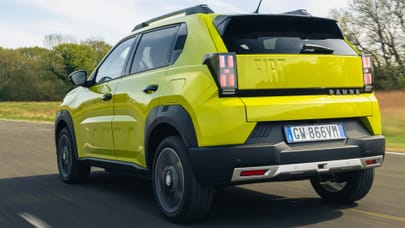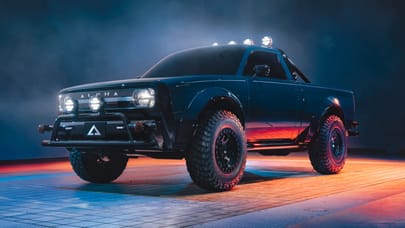
Ten things we learned this week: 3 November 2017 edition
Singing cars, Aston's lightweight racer and smartphones as mechanics

We might not have enough cobalt and nickel for our electric car future

It’s no secret that city air is harmful to your health. You could level that accusation against any number of European, American and Asian cities – including more than 40 in our own neck of the woods.
And the general consensus is that electric cars (or at least electrified cars) are the way to reduce both the noxious nitrogen oxides within our cities and the climate-changing CO2 without.
But there’s a particular fly in that ointment – it seems that the supply of all-important cobalt and nickel is in question. Make your jokes here about “not having the minerals” now.
As the name suggests, Lithium salts are the main ingredient in Lithium-ion batteries. But nickel and cobalt are necessary for the construction of the cathode in the cell, regardless of whether it’s a new-fangled solid-state battery or not.
Although nickel is generally plentiful, the primo, high-quality stuff is as rare as uncooked beef. In more bad news, the world’s largest-known supply of cobalt comes from the Democratic Republic of the Congo, or DRC. And the UK government’s travel advice for the DRC includes choice phrases like, “Continued presence of armed groups, military operations against them [and] intercommunal violence”, “A deterioration in the political, security and humanitarian situation” and, “The risk of kidnap or injury as a result of armed or criminal activity remains high.”
And trying to ensure the steady extraction and export of cobalt from somewhere like that seems... tricky.
Advertisement - Page continues belowNissan’s invented a singing car
{"fid":"680431","view_mode":"wysiwyg","fields":{"format":"wysiwyg","field_media_brightcove_player[und]":"_none","field_media_video_duration[und][0][value]":""},"type":"media","link_text":null,"attributes":{"alt":"Nissan sings with debut of ‘Canto’ at 2017 Tokyo Motor Show","height":428,"width":760,"class":"media-element file-wysiwyg"}}
Well, not so much singing as quietly humming; the kind of noise that you’d expect to hear Kryten from Red Dwarf make while dreaming about electric sheep.
The idea is that electric cars won’t give off the same aural cues as combustion-powered vehicles and may put people in harm’s way. If cities continue to be loud, frenetic places, quieter traffic will become increasingly difficult to discern from the din.
But, if all traffic was either powered by near-silent electric motors or by the old-school ‘two feet and a heartbeat’ approach, it stands to reason that pedestrians would be able to pick up the quieter – but still very noticeable – sounds created by tyres rolling on concrete or asphalt. But that doesn’t seem like a good enough answer for regulators, who’ve decreed that all new electric cars built from 2019 onwards should emit a noise while moving.
So, it seems that every futuristic sci-fi movie that depicted quietly humming electric cars may have been on to something after all.
Mechanics of the future could diagnose your troubles with a smartphone

Apparently, using nothing more than what comes with your iPhone, Pixel, Galaxy or whatever everyone’s buying these days, it’ll soon be possible to troubleshoot anything from an unhappy engine to unbalanced wheels.
For instance, it seems that a clogged air filter will make a whistling, emphysemic sound as the engine struggles to suck air through it. It’s not something that people can “differentiate from the other engine noise,” apparently, “but your phone can,” according to an infuriatingly clever person from MIT.
Oh, and to diagnose wheel balance issues, an algorithm that interprets data from a phone’s inbuilt accelerometers and GPS transceivers has already outperformed expert car testers, according to the MIT clever person.
Advertisement - Page continues belowPagani’s launched a restoration service, because the Zonda is already that old

Yep, the first Pagani Zondas were already being delivered to eager customers (at least, we’re assuming that they were eager. We would have been) back in 1999.
Now, for those who are old enough to have lived through it, let’s take the briefest run down memory lane. It was a year that gave us the euro, The Matrix, Spongebob Squarepants, Fight Club, Family Guy and Futurama, Bill Clinton’s impeachment proceedings, Napster, Y2K hysteria, MSN Messenger (anyone else remember ‘A/S/L?’), the giant clusterfornication that was the Woodstock ’99 festival, and Grand Theft Auto 2. Oh, and Australia voted against ditching the Queen and becoming a republic, while the world failed to care about the outcome either way.
And, in perhaps some slightly depressing news, today is the best part of 20 years hence. So, it’s about time for Zondas to undergo a bit of a spring clean and refresh. Hey, McLaren’s already doing it for the F1…
Apparently 40 per cent of us carry too much crap in our boots

And, if you’re from Sunderland, you’re particularly bad, with two-thirds of Mackems admitting to a particularly shambolic luggage area. Perhaps unsurprisingly, those from Cheshire had the cleanest cars.
The point that the study was trying to make is that for every 50kg of junk in your car, your fuel economy drops by two per cent. We presume that it’d actually vary more than that – for instance, if you had a Suzuki Mighty Boy, 50kg is a considerable weight penalty and would have more of an effect than, say, 50kg in an Audi SQ7.
In response to the study, the French shrugged and then mandated carrying another three safety triangles and a Honda Super Cub in the boot at all times.
It seems that we’re the problem with diesel cars

By which we mean that thousands of ne’er-do-wells have taken to removing the diesel particulate filter (DPF) from their cars, ensuring that every one of the nasty particles created by their engines flows out into the immediate atmosphere and into our lungs. Thanks, guys.
The penalty for driving without a DPF is £1,000 for cars and £2,500 for commercial vehicles. The problem there is that replacing the filter when it wears out tends to run to about £1,000 on its own. So, those who can’t (or don’t want to) shell out for a new filter only run a relatively small risk of a fine that’s about what they’d have to spend on the filter in the first place.
New plan: anyone caught driving with their DPF removed gets their exhaust rerouted into the cabin, so they get first dibs on the crap they’re spewing out.
Ferrari’s threatening to quit F1... again

This time, it’s over Liberty Media’s plans to revitalise the sport and change much of what the new owners see as issues with Formula 1 – by which we mean to try and tackle the runaway costs of competing so that results are not just a function of team spending. But it seems the way they’re going about it has earned some severe consternation from those holding the reins of the prancing horse.
As such, head honcho Sergio Marchionne has said that “we now appear to be at odds in terms of the strategic development of this thing, and we see the sport in 2021 taking on a different air, is going to force some decisions on the part of Ferrari.”
“I think it needs to be absolutely clear that unless we find a set of circumstances, the results of which are beneficial to the maintenance of the brand, and the marketplace, and to the strengthening of the unique position for Ferrari, Ferrari will not play.”
Advertisement - Page continues belowTruckers keep crashing into rail bridges

In fact, it’s gotten to the point where Network Rail and Transport for London have had to launch a campaign to stop absent-minded lorryists from smacking their HGVs into rail bridges.
The campaign, with “eye-catching straplines” like ‘What the truck’ and ‘Lorries can’t limbo’, aims to reduce the number of entirely blithe drivers that careen into overpasses. At the moment, it’s about 2,000 per annum, with this part of the year particularly bad.
As well as attempting to reduce the number of strikes through driver education programmes and yet more signposting, the campaign’s also shoring up bridges with extra steel beams and attempting to enact heavier penalties for drivers who hit rail bridges.
Aston Martin’s built an ultra-lightweight rear-drive special edition

However, we regret to interrupt this joyous announcement to point out Aston Martin has not dreamt up a Caterham or Ariel rival. Instead, it’s made a bicycle. Or rather, teamed up with Storck to create 107 examples of this, the Storck Fascenario.3 Aston Martin Edition.
The frame (which weighs just 770 grams) plus the forks are make from carbon fibre, and the whole bike only weighs 5.9kg once pesky necessities like wheels and a transmission have been fitted. Wireless ‘paddle shift’-oprated gears feature, and the bike wears Pirelli P Zero tyres.
So, if you missed out on the Vulcan track day toy, this has to be the next best thing. Lycra not included.Advertisement - Page continues belowGrandparents are putting kids at risk

Yup, the latest danger to our kids is… our parents.
And it’s not because they’re egregiously overfeeding our progenies every time they walk through the door, or swaddling them in so many clothes that they could pass as a body double of the Michelin man and therefore lose the ability to self-regulate body temperature.
Apparently, it’s because these new-fangled car booster seats don’t fit in with older generations’ ideas on in-car safety.
Back in the day, legislation really only extended to seat belts. However, since 2006, any kids shorter than 135cm, or younger than 12, have to sit in a booster seat that’s appropriate to their size and frailty.
Yes, 12 years old.
Unfortunately, 60 per cent of grandparents didn’t actually know their obligations in terms of car seats, and 14 per cent “admitted they don’t always follow recommended car seat rules”.
So, is it time to reconsider your free babysitting service?
Trending this week
- Car Review
BMW iX3







